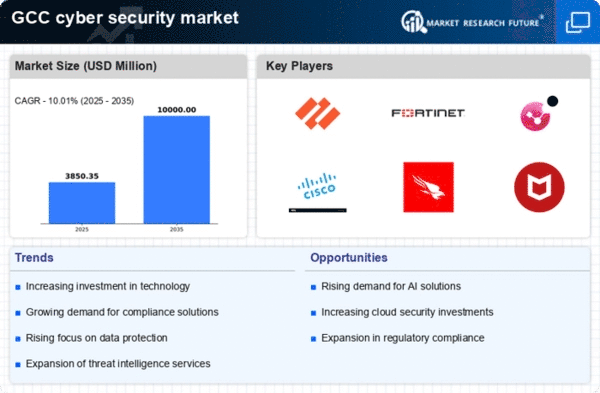Rising Cyber Threats
The cyber security market is experiencing heightened demand due to the increasing frequency and sophistication of cyber threats. In the GCC region, organizations are facing a surge in cyberattacks, with reports indicating a rise of over 30% in incidents over the past year. This alarming trend compels businesses to invest in robust cyber security solutions to safeguard their sensitive data and maintain operational integrity. As cybercriminals adopt more advanced tactics, the need for comprehensive security measures becomes paramount. Consequently, the cyber security market is projected to grow significantly, with estimates suggesting a compound annual growth rate (CAGR) of around 15% through 2026. This growth reflects the urgent need for organizations to enhance their defenses against evolving threats.
Increased Regulatory Scrutiny
The cyber security market is also influenced by the growing regulatory scrutiny in the GCC region. Governments are implementing stricter regulations to ensure that organizations adhere to best practices in data protection and cyber security. Compliance with these regulations is becoming increasingly critical, as non-compliance can result in substantial fines and reputational damage. For instance, recent legislation mandates that companies must report data breaches within a specified timeframe, thereby increasing the demand for effective incident response solutions. This regulatory environment is likely to drive investments in the cyber security market, as organizations prioritize compliance and risk management strategies to avoid potential penalties.
Government Initiatives and Support
Government initiatives play a crucial role in shaping the cyber security market. In the GCC, various governments are actively promoting cyber security awareness and investment through strategic frameworks and policies. For instance, the establishment of national cyber security strategies aims to bolster the resilience of critical infrastructure against cyber threats. These initiatives not only encourage public sector organizations to adopt advanced security measures but also stimulate private sector engagement. The cyber security market is likely to benefit from increased funding and support, with government budgets for cyber security projected to rise by approximately 20% in the coming years. This proactive approach indicates a commitment to enhancing national security and protecting economic interests.
Emerging Technologies and Innovations
The cyber security market is witnessing a wave of innovation driven by emerging technologies such as artificial intelligence (AI) and machine learning (ML). These technologies are being integrated into security solutions to enhance threat detection and response capabilities. In the GCC, organizations are increasingly adopting AI-driven security tools to analyze vast amounts of data and identify potential threats in real-time. This trend is expected to propel the cyber security market forward, with forecasts indicating a growth rate of approximately 18% in the adoption of AI-based security solutions over the next few years. As businesses seek to stay ahead of cyber threats, the integration of innovative technologies will be pivotal in shaping the future landscape of the cyber security market.
Digital Transformation and Cloud Adoption
The ongoing digital transformation across various sectors in the GCC is significantly impacting the cyber security market. As organizations increasingly migrate to cloud-based solutions, the demand for effective security measures to protect sensitive information stored in the cloud is intensifying. Reports suggest that cloud adoption in the region has grown by over 40% in the last two years, leading to a corresponding rise in the need for specialized cyber security services. This shift necessitates the implementation of advanced security protocols to mitigate risks associated with data breaches and unauthorized access. Consequently, the cyber security market is expected to expand as businesses seek to secure their digital assets and ensure compliance with regulatory requirements.
















